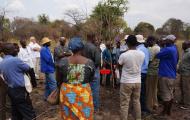Department Resources
July 28, 2025
August 17, 2024
The close of the last decade saw a heightened concern by the global community around the triple planetary crisis of biodiversity loss, cl
May 13, 2024
May 13, 2024
September 19, 2020
The African Union Commission (AUC) envisions “an integrated continent that is politically united based on the ideals of Pan Africanism an
June 24, 2020
Highlights of the cooperation with the GIZ-project “Support to the African Union on Migration and Displacement”
June 24, 2020
Violent extremism is a global issue.
August 22, 2025
August 21, 2025
July 28, 2025
January 09, 2025
CAADP Strategy and Action Plan: 2026-2035 (Building Resilient and Sustainable Agrifood Systems in Africa) at the AU Extraordinary Summit
January 09, 2025
Kampala CAADP Declaration on Building Resilient and Sustainable Agrifood Systems in Africa at Extraordinary Au Summit on The Post-Malabo
December 30, 2024



